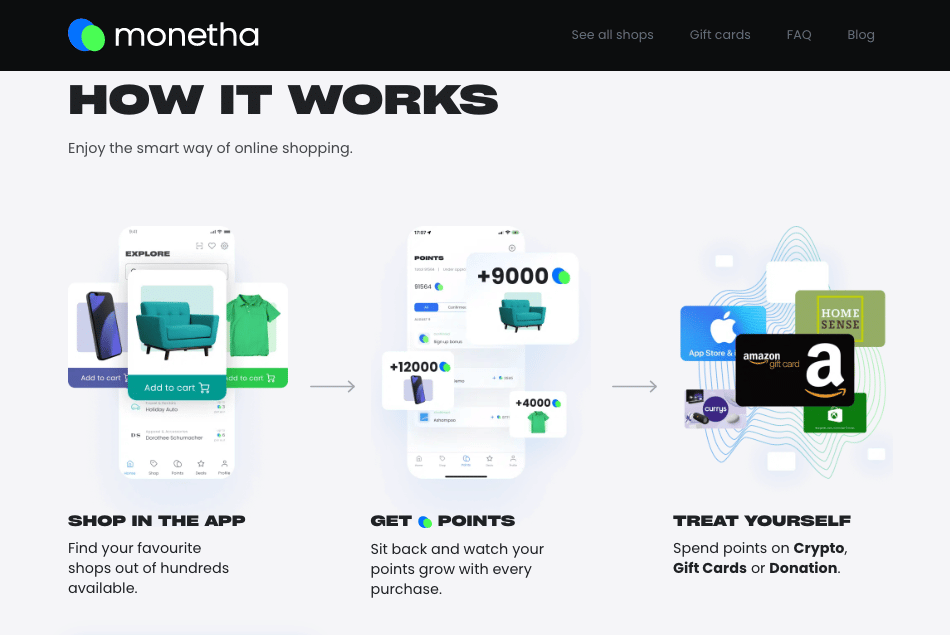Definition of customer relations – let’s keep it simple
Before we talk about segmented communication channels, customer loyalty, enhanced retention, technical support, active listening, or even the quagmire of consistent revenue generation, let’s keep it simple.
Customer relations simply refers to how a business and its customers interact with each other over time and the effect of these interactions on the business.
Like any relationship, creating positive customer relations is a two-way street where traffic must be managed very carefully. For businesses, that’s usually the role of an attentive, imaginative, and engaging customer service department together with incentives like loyalty and rewards programs, great customer service, and knowing instinctively what it is that the customer wants.
It's all about loyal customers
We provide the easiest way for growing brands to start a loyalty program. Fast, easy, effective!

Benefits of good customer relations in e-commerce
Before we delve into the benefits of maintaining positive customer relations in e-commerce businesses, it’s probably best to emphasize one thing.
There are no drawbacks to maintaining positive customer relations in e-commerce. None.
Maintaining good customer relations directly promotes customer satisfaction, improves profitability, stimulates greater brand loyalty, and increases the chances of long-term success.
A good customer relationship promotes customer satisfaction
How do you know if your customers are satisfied or not if you don’t ask them?
A dissatisfied customer is unlikely to tell an e-commerce business owner directly – at least of their own free will. Instead, they are more likely simply never to return, or worse still, spread the news to other prospective customers about their dissatisfaction.
To understand your customer’s level of satisfaction it is vital to create open channels of communication and solicit customer feedback.
Failing that, customer satisfaction surveys can do two other important things.
- Collect vital information to help you fix any problems encountered by the customer and identify ways in which to better engage with the user and create better customer relations
- Illustrate to your customers that their opinions and thoughts matter to you and your business and that creating positive customer relationships with customers inspires your company to do everything it takes to maintain their loyalty
Through open and honest feedback, e-commerce business owners can identify any blockages in the sales pipeline. Armed with this feedback, the business owner now has the power to solve any problematic issues and build the customer’s trust through dialogue and transparency.

Increases profitability
A satisfied customer will tell one person, a dissatisfied customer will tell a lot more.
That means that satisfied customers hold the power to increase a business’s profitability, while dissatisfied customers have the potential to ruin it.
Business owners should think of satisfied customers as unpaid sales executives extolling the benefits of your business wherever they go. They have the power to directly increase profitability through positive word-of-mouth referrals – they also have the power to do the opposite should they become disgruntled for any reason.
While the jury may still be out on a final verdict, it is often questioned whether good customer relations affect a customer’s willingness to pay more for a product or service.
Exploiting an established good relationship in order to directly increase profitability should be considered very carefully before making any uncalculated moves. So far, there is no proof to endorse the idea that satisfied customers are willing to pay more for a product or service.
Your perfect loyalty program
Keep your customers satisfied – it all starts with just a few clicks.

Stimulates greater brand loyalty
Having developed a good relationship with your customers, maintaining that status is key to nourishing customer loyalty.
Believe it or not, relationship marketing is a real term employed by forward-thinking businesses. At its most basic level, it means creating more meaningful customer experiences, nurturing a deeper engagement, and personalizing every experience as much as possible.
Relationship marketers use various means of generating that loyalty based on good customer relations.
Learning from feedback – customer feedback from satisfaction surveys can help cultivate good customer relationships that can go a long way towards making better business decisions, developing a better product or service, creating better marketing strategies, and nurturing more adhesive brand loyalty.
Acting on your customer’s feedback also increases their lifetime value to your brand. Remember, the cost of acquiring new customers is far greater than the acts of customer conversion and retention.

Differentiates your business from your competitors
By delivering outstanding service to your customers, you’ve already stated your intention to be better than your competitors.
Going above and beyond the call of duty for your clients – rooting out the cause of problems, working meticulously to solve any issues, learning and improving from customer feedback, personalizing your service to each individual customer – all scream from the rooftops your intention to be the best in the business.
If you really are committed to delivering an outstanding customer experience, getting to know your customers, their habits, their likes and dislikes, and the problems they face will give you an edge over your competitors, even during the lean times.

Improves brand reputation
If you really want to sharpen the edge of your customer relations, every serious business should be armed with the best CRM tool (Customer Relationship Management) they can afford.
A good CRM will help you get all the metrics you need instantly on a customer’s journey through the sales pipeline, and beyond. Plus, your CRM can keep track of all past conversations, requests, and/or complaints
If you can manage that journey without any major issues – or correct them as soon as they happen – you’ve already gone a long way toward enhancing your brand’s reputation.

Helps you grow your business
Instilling a culture of nourishing and preserving good customer relationships creates an environment with all the right conditions to promote business growth.
Let’s put it another way.
If your customers are happy, it means that your entire team is doing something very right. You have already identified and built a well-oiled internal process. That means that not only your customers are happy, but your employees are too.
Employees with a high rate of satisfaction will work harder to promote and grow the business beyond what is expected of them.
Got questions? Book demo!
Secure your growth by improving customer retention and reducing churn – book a 30 minute demo.

Reduces running costs
An e-commerce business comes with its own set of unique problems that are sometimes out of its control – couriers and shipping partners can delay deliveries.
However, having a communications system in place that works, along with having developed a good customer relationship policy can go a long way to alleviate any unexpected problems.
A simple automated package tracking system will keep the customer informed of any delays or other circumstances should they occur. Customers with whom you’ve developed a good working relationship are more likely to accept unexpected situations as long as they are kept in the loop.
Being able to manage such situations – sometimes before they even occur – will save you a lot of money in the long run. No replacements, no refunds, and no compensation.
Plus, a well-honed customer satisfaction team will keep complaints and negative issues to a minimum, requiring less staff and saving you additional money.

How to build strong customer relationships
Customer relationship management is an integral part of the success of any e-commerce business and increases a sense of brand loyalty which will reap rewards for years to come.
But customer loyalty and good customer relationships don’t come about by accident. They take work and a lot of work.
Here we’re going to look at the most effective ways of improving customer relationships that will last longer and bring greater rewards to your e-commerce business.
Listen to your customers
Asking for customer feedback through surveys, questionnaires, and branded forums will give you a lot of the data you need to enhance your customers’ experience.
This information will help you to personalize future interactions, make sound product development decisions, create new marketing strategies, and get to understand your customers’ voices and the problems they experience.
Building a user-friendly multi-channel feedback process means that your customers are always kept in the loop. Creating a 360-degree communication omnichannel goes a long way toward nurturing brand loyalty and building loyal customer relationships.

Make your customer relationships personal
Making your customers feel uniquely special and part of a larger community – especially when you operate a big e-commerce store – creates a sense of belonging and helps to instill the idea that their voice is important, even among the crowds.
One great way of building a personal touch is by using the information generated from your data streams – newsletter, satisfaction surveys, sign-up information, etc.
Automatically using this information to personalize any further communications, offers, or services helps to create a customer relationship to be proud of.

Using Shopify? Reap rewards now!
Add the Monetha Loyalty & Rewards app to your Shopify store and increase your business performance!
Build positive customer relations with a quality rewards program
As much as we might think that customers of our e-commerce store love discounts, the fact is that they love rewards and incentives even more.
One of the best ways to grow your customer relationships, and increase their sense of loyalty, is by introducing a rewards program to your e-commerce store.
For a great example of a rewards program loved by shoppers, you don’t have to look further than the Monetha online rewards program.
Monetha works in a super-simple way.
Online shoppers download the free Monetha app and sign up. Once they’ve signed up they have access to over 1,200 premium online stores. Every time they make a purchase or book a service from one of Monetha’s merchant partners they accumulate points.
The points can then be used to exchange for gift cards from brands like eBay, Amazon, Apple, Ikea, Spotify, Walmart, HomeSense, TK Maxx, Virgin Experiences, and thousands of others.
Or the points can be used to invest in cryptocurrencies or donated to a worthwhile international charity of the customer’s choice. What’s not to love?
This simple rewards program helps instill a sense of loyalty in online shoppers, bringing them back to your store repeatedly.

Create the perfect customer service team
Giving good customer service isn’t just one thing you do, it’s a combination of everything that your brand does, says, or represents.
It’s the quality and price of your products. It’s the attitude of your customer service employees. It’s the speed at which your website loads. It’s the reliability of your delivery promises. It’s everything.
Because exceptional customer service and the creation of good customer relationships depend on so many factors, there’s always the danger that one element could bring the whole house of cards tumbling down.
It’s not an easy thing to have so many balls in the air at one time. But if you can build a customer service team that really works and can act or react to any situation you’ve already gone a long way toward building the loyalty that comes from great customer relations.

Engage your customers in any way possible
It doesn’t really matter if it takes a carrier pigeon to reach your customer, once you’ve found a way to communicate – that suits them – you’ve already created one part of an omnichannel approach to building better customer relations.
The important thing to know is that your customers will engage with your brand in different ways – directly via your store or app, through forums, social media, email, YouTube, Instagram, loyalty programs, and a hundred other ways. If you’re not there to welcome them, they’ll go somewhere else.
It might sound like an impossibility to manage so many channels at once, but don’t fret yourself. There are already many intuitive platforms and software solutions that can help you manage multiple channels at once.

How’s your after-sales service?
So, you’ve managed to take your customer on the complete sales journey, congratulations!
And what’s more, you’ve even managed to create positive customer relations along the way, and it looks like you’ve created a loyal customer for life.
But wait, it’s not finished yet. Have you analyzed how good your after-sales service is?
Many e-commerce store owners drop the ball after the sale has been made. If that’s the case, you might as well never have started your journey with the customer in the first place.
After the sale has been made and the delivery completed, ask yourself the following questions:
- Did they receive their order as promised?
- How was the delivery process?
- Were there any hiccups along the way?
- Are they satisfied with the quality of the product?
- Are they satisfied with the final price?
- Are they satisfied with the method of payment?
- Did you remind them about your loyalty program?
- Is there anything else you can do for them?
- Did you ask them to complete a customer satisfaction survey?
- And when the time is right will you contact them again to make them another relevant offer or an upgrade on the product they’ve already purchased?
CRM software can be your best friend when it comes to after-sales service and sustaining a good customer relationship.
Your automated CRM tasks make sure that any request for support is forwarded to the right department and the right person directly.
Your CRM system can also automate any Q&A sessions when the relevant person is out of the office or during after-hours.
Think of your CRM software as an extension of your customer service team helping to create positive customer experiences and personalized interactions.
There is a simpler way to success
Boost your average order value, drive repeat purchases, maximize your profits, and more – integrate loyalty program with Monetha!

Conclusion
Creating great and lasting customer relationships is vital for any business, but most especially for e-commerce operations where the owners and employees remain largely anonymous.
Unlike in traditional retailing strategies where the sales journey was a lot shorter but came with greater one-on-one interaction, it’s up to the e-commerce business owner to ensure that nothing is missed before, during, and after the sales process.
Customer satisfaction surveys and a good CRM software platform are some of the best tools for any e-commerce business owner to keep on top of their customer relations status.
Knowing what the customer is thinking, how they respond to different stimuli, the problems they encounter, and any after-sales issues can help you design the architecture behind the perfect sales journey.
Another strategy for creating loyalty and nurturing good customer relationships is through the introduction of a loyalty and rewards program like the Monetha rewards app we mentioned earlier.
Discounts are all well and good, but to ensure a customer’s loyalty, the program must be flexible across different pillars – can they use the rewards in other stores, are the rewards what they want, and how easy it is to collect and redeem the rewards.
There are many ways to build positive customer relationships. However, identifying and retaining loyal customers should always be at the top of your priorities.
The more you know about your customer – satisfaction surveys can help with that – the easier it is to create a marketing strategy that generates a personalized service and more meaningful relationships with customers.
